Analyzing Sustainability and Ethics: The Case of Marks & Spencer's CSR
VerifiedAdded on 2023/06/16
|10
|2999
|61
Report
AI Summary
This report explores the concepts of ethics and sustainability in business, focusing on corporate social responsibility (CSR) and stakeholder analysis, using Marks & Spencer as a case study. It reviews business strategy management concepts and their relation to ethics and sustainability, highlighting CSR practices and stakeholder engagement at Marks & Spencer. The research methodology employs a positivist philosophy and deductive approach, relying on secondary data collection through literature review. The report analyzes Marks & Spencer's CSR initiatives, including garment recycling, donations to charity partners, and the use of eco-friendly materials. It emphasizes the importance of social responsibility towards employees and the environment, ultimately aiming to provide insights for managers to make effective decisions regarding CSR efforts and their impact on stakeholders. The report concludes by summarizing the key findings and their implications for business ethics and sustainability.
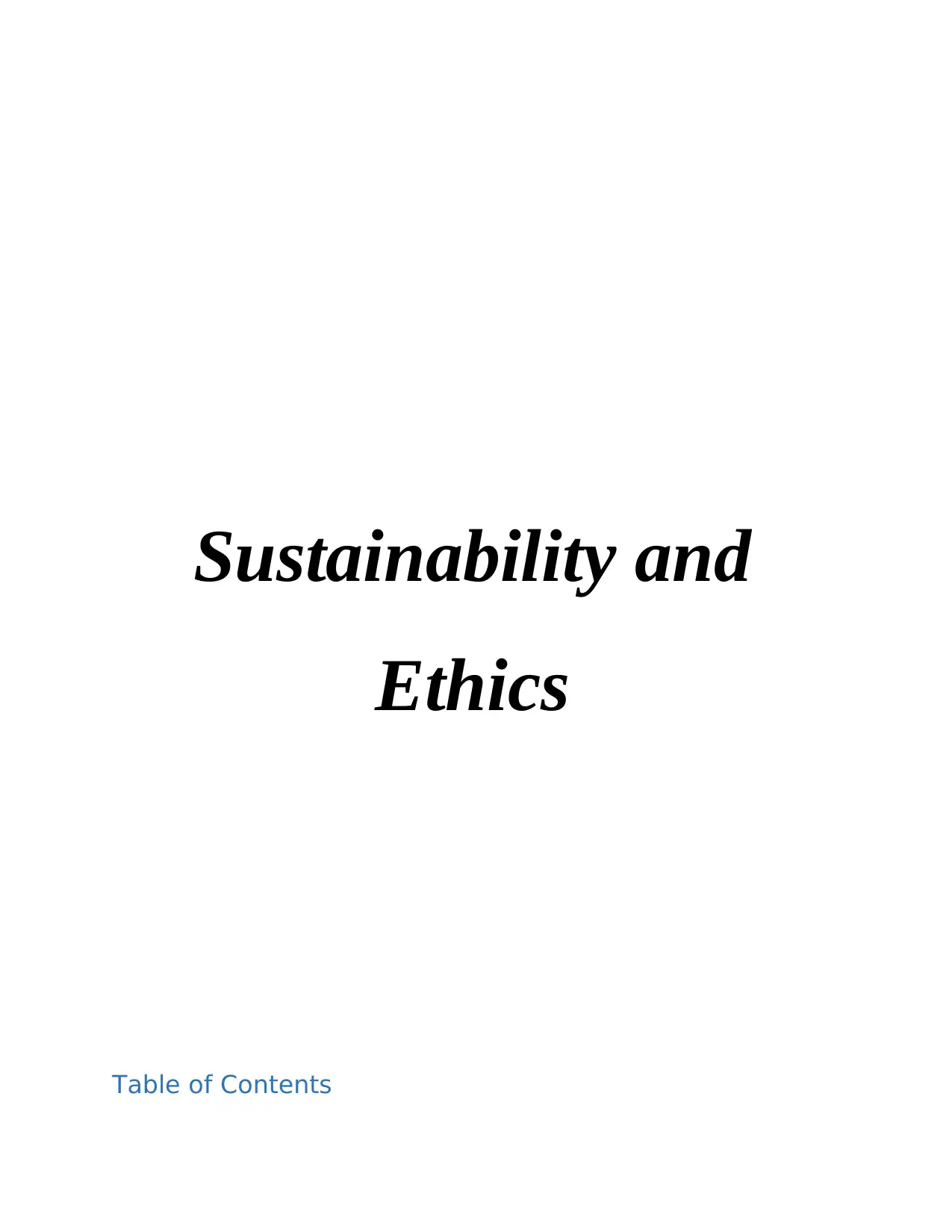
Sustainability and
Ethics
Table of Contents
Ethics
Table of Contents
Paraphrase This Document
Need a fresh take? Get an instant paraphrase of this document with our AI Paraphraser
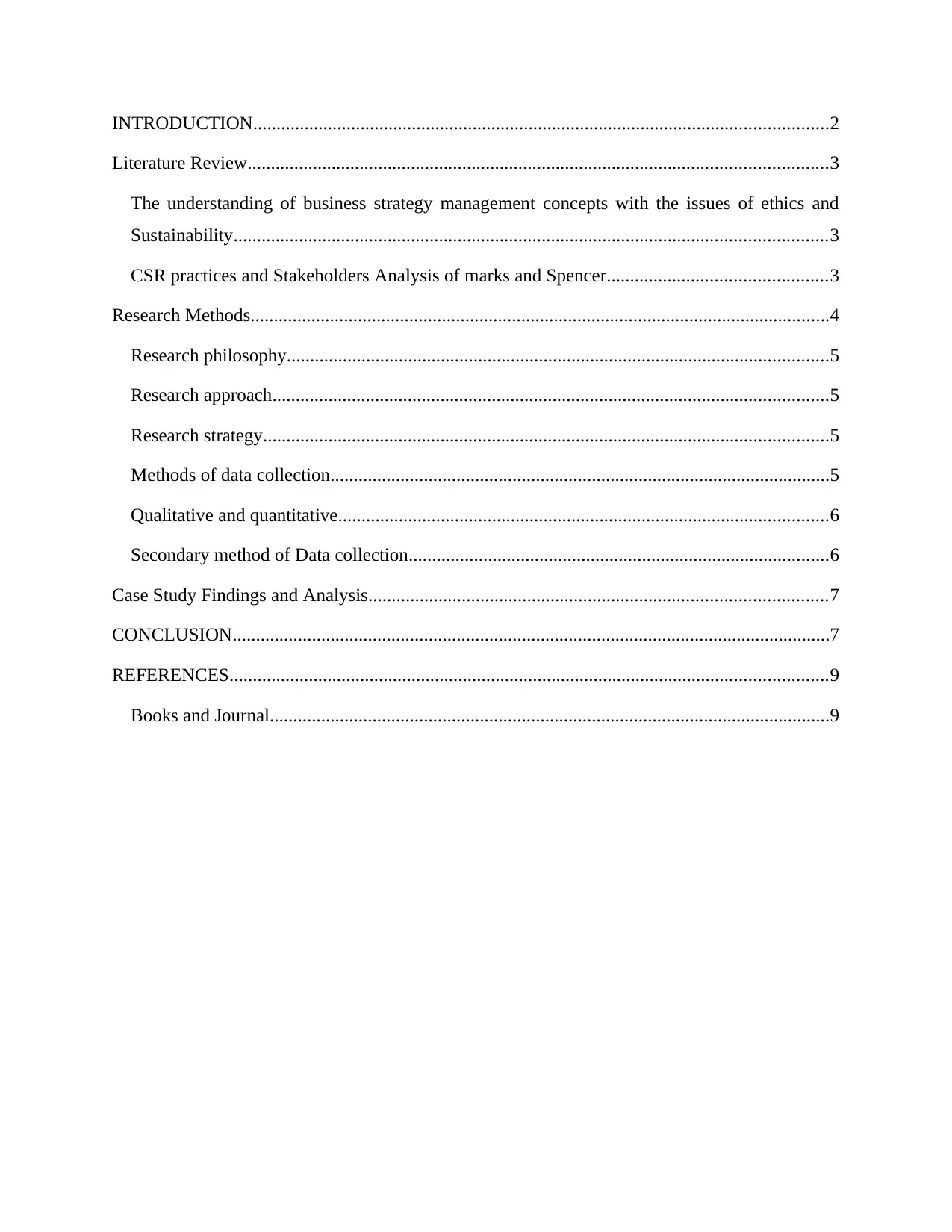
INTRODUCTION...........................................................................................................................2
Literature Review............................................................................................................................3
The understanding of business strategy management concepts with the issues of ethics and
Sustainability...............................................................................................................................3
CSR practices and Stakeholders Analysis of marks and Spencer...............................................3
Research Methods............................................................................................................................4
Research philosophy....................................................................................................................5
Research approach.......................................................................................................................5
Research strategy.........................................................................................................................5
Methods of data collection...........................................................................................................5
Qualitative and quantitative.........................................................................................................6
Secondary method of Data collection..........................................................................................6
Case Study Findings and Analysis..................................................................................................7
CONCLUSION................................................................................................................................7
REFERENCES................................................................................................................................9
Books and Journal........................................................................................................................9
Literature Review............................................................................................................................3
The understanding of business strategy management concepts with the issues of ethics and
Sustainability...............................................................................................................................3
CSR practices and Stakeholders Analysis of marks and Spencer...............................................3
Research Methods............................................................................................................................4
Research philosophy....................................................................................................................5
Research approach.......................................................................................................................5
Research strategy.........................................................................................................................5
Methods of data collection...........................................................................................................5
Qualitative and quantitative.........................................................................................................6
Secondary method of Data collection..........................................................................................6
Case Study Findings and Analysis..................................................................................................7
CONCLUSION................................................................................................................................7
REFERENCES................................................................................................................................9
Books and Journal........................................................................................................................9
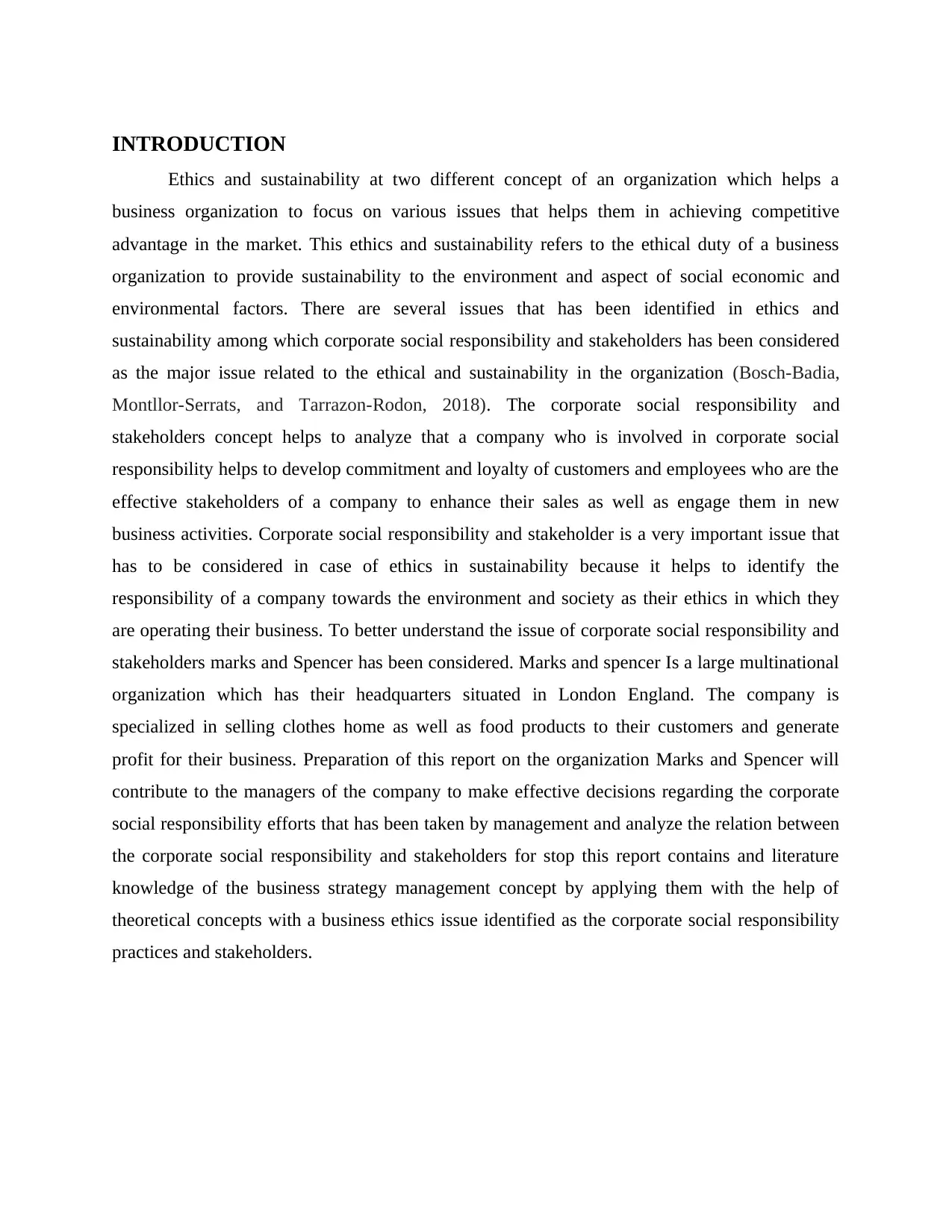
INTRODUCTION
Ethics and sustainability at two different concept of an organization which helps a
business organization to focus on various issues that helps them in achieving competitive
advantage in the market. This ethics and sustainability refers to the ethical duty of a business
organization to provide sustainability to the environment and aspect of social economic and
environmental factors. There are several issues that has been identified in ethics and
sustainability among which corporate social responsibility and stakeholders has been considered
as the major issue related to the ethical and sustainability in the organization (Bosch-Badia,
Montllor-Serrats, and Tarrazon-Rodon, 2018). The corporate social responsibility and
stakeholders concept helps to analyze that a company who is involved in corporate social
responsibility helps to develop commitment and loyalty of customers and employees who are the
effective stakeholders of a company to enhance their sales as well as engage them in new
business activities. Corporate social responsibility and stakeholder is a very important issue that
has to be considered in case of ethics in sustainability because it helps to identify the
responsibility of a company towards the environment and society as their ethics in which they
are operating their business. To better understand the issue of corporate social responsibility and
stakeholders marks and Spencer has been considered. Marks and spencer Is a large multinational
organization which has their headquarters situated in London England. The company is
specialized in selling clothes home as well as food products to their customers and generate
profit for their business. Preparation of this report on the organization Marks and Spencer will
contribute to the managers of the company to make effective decisions regarding the corporate
social responsibility efforts that has been taken by management and analyze the relation between
the corporate social responsibility and stakeholders for stop this report contains and literature
knowledge of the business strategy management concept by applying them with the help of
theoretical concepts with a business ethics issue identified as the corporate social responsibility
practices and stakeholders.
Ethics and sustainability at two different concept of an organization which helps a
business organization to focus on various issues that helps them in achieving competitive
advantage in the market. This ethics and sustainability refers to the ethical duty of a business
organization to provide sustainability to the environment and aspect of social economic and
environmental factors. There are several issues that has been identified in ethics and
sustainability among which corporate social responsibility and stakeholders has been considered
as the major issue related to the ethical and sustainability in the organization (Bosch-Badia,
Montllor-Serrats, and Tarrazon-Rodon, 2018). The corporate social responsibility and
stakeholders concept helps to analyze that a company who is involved in corporate social
responsibility helps to develop commitment and loyalty of customers and employees who are the
effective stakeholders of a company to enhance their sales as well as engage them in new
business activities. Corporate social responsibility and stakeholder is a very important issue that
has to be considered in case of ethics in sustainability because it helps to identify the
responsibility of a company towards the environment and society as their ethics in which they
are operating their business. To better understand the issue of corporate social responsibility and
stakeholders marks and Spencer has been considered. Marks and spencer Is a large multinational
organization which has their headquarters situated in London England. The company is
specialized in selling clothes home as well as food products to their customers and generate
profit for their business. Preparation of this report on the organization Marks and Spencer will
contribute to the managers of the company to make effective decisions regarding the corporate
social responsibility efforts that has been taken by management and analyze the relation between
the corporate social responsibility and stakeholders for stop this report contains and literature
knowledge of the business strategy management concept by applying them with the help of
theoretical concepts with a business ethics issue identified as the corporate social responsibility
practices and stakeholders.
⊘ This is a preview!⊘
Do you want full access?
Subscribe today to unlock all pages.

Trusted by 1+ million students worldwide
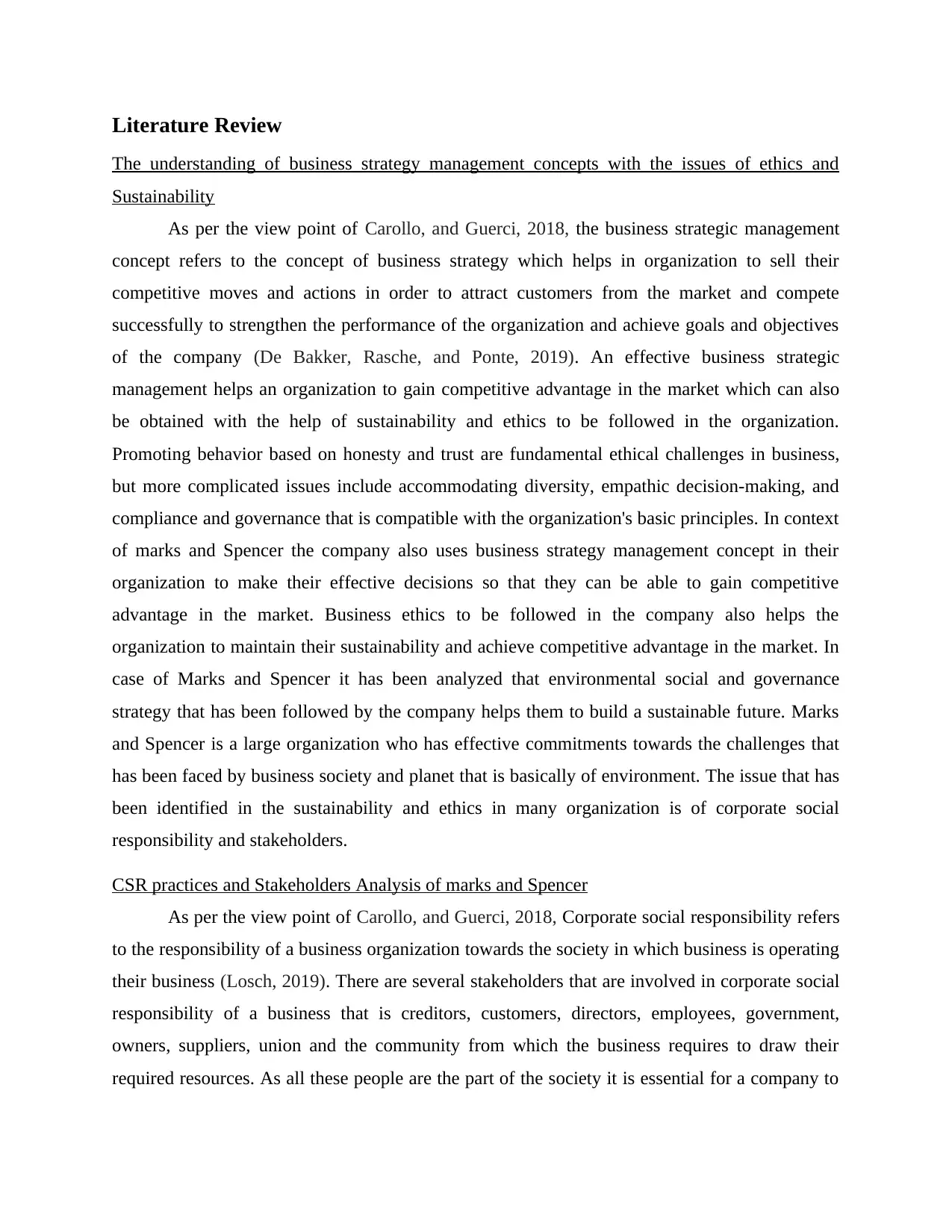
Literature Review
The understanding of business strategy management concepts with the issues of ethics and
Sustainability
As per the view point of Carollo, and Guerci, 2018, the business strategic management
concept refers to the concept of business strategy which helps in organization to sell their
competitive moves and actions in order to attract customers from the market and compete
successfully to strengthen the performance of the organization and achieve goals and objectives
of the company (De Bakker, Rasche, and Ponte, 2019). An effective business strategic
management helps an organization to gain competitive advantage in the market which can also
be obtained with the help of sustainability and ethics to be followed in the organization.
Promoting behavior based on honesty and trust are fundamental ethical challenges in business,
but more complicated issues include accommodating diversity, empathic decision-making, and
compliance and governance that is compatible with the organization's basic principles. In context
of marks and Spencer the company also uses business strategy management concept in their
organization to make their effective decisions so that they can be able to gain competitive
advantage in the market. Business ethics to be followed in the company also helps the
organization to maintain their sustainability and achieve competitive advantage in the market. In
case of Marks and Spencer it has been analyzed that environmental social and governance
strategy that has been followed by the company helps them to build a sustainable future. Marks
and Spencer is a large organization who has effective commitments towards the challenges that
has been faced by business society and planet that is basically of environment. The issue that has
been identified in the sustainability and ethics in many organization is of corporate social
responsibility and stakeholders.
CSR practices and Stakeholders Analysis of marks and Spencer
As per the view point of Carollo, and Guerci, 2018, Corporate social responsibility refers
to the responsibility of a business organization towards the society in which business is operating
their business (Losch, 2019). There are several stakeholders that are involved in corporate social
responsibility of a business that is creditors, customers, directors, employees, government,
owners, suppliers, union and the community from which the business requires to draw their
required resources. As all these people are the part of the society it is essential for a company to
The understanding of business strategy management concepts with the issues of ethics and
Sustainability
As per the view point of Carollo, and Guerci, 2018, the business strategic management
concept refers to the concept of business strategy which helps in organization to sell their
competitive moves and actions in order to attract customers from the market and compete
successfully to strengthen the performance of the organization and achieve goals and objectives
of the company (De Bakker, Rasche, and Ponte, 2019). An effective business strategic
management helps an organization to gain competitive advantage in the market which can also
be obtained with the help of sustainability and ethics to be followed in the organization.
Promoting behavior based on honesty and trust are fundamental ethical challenges in business,
but more complicated issues include accommodating diversity, empathic decision-making, and
compliance and governance that is compatible with the organization's basic principles. In context
of marks and Spencer the company also uses business strategy management concept in their
organization to make their effective decisions so that they can be able to gain competitive
advantage in the market. Business ethics to be followed in the company also helps the
organization to maintain their sustainability and achieve competitive advantage in the market. In
case of Marks and Spencer it has been analyzed that environmental social and governance
strategy that has been followed by the company helps them to build a sustainable future. Marks
and Spencer is a large organization who has effective commitments towards the challenges that
has been faced by business society and planet that is basically of environment. The issue that has
been identified in the sustainability and ethics in many organization is of corporate social
responsibility and stakeholders.
CSR practices and Stakeholders Analysis of marks and Spencer
As per the view point of Carollo, and Guerci, 2018, Corporate social responsibility refers
to the responsibility of a business organization towards the society in which business is operating
their business (Losch, 2019). There are several stakeholders that are involved in corporate social
responsibility of a business that is creditors, customers, directors, employees, government,
owners, suppliers, union and the community from which the business requires to draw their
required resources. As all these people are the part of the society it is essential for a company to
Paraphrase This Document
Need a fresh take? Get an instant paraphrase of this document with our AI Paraphraser
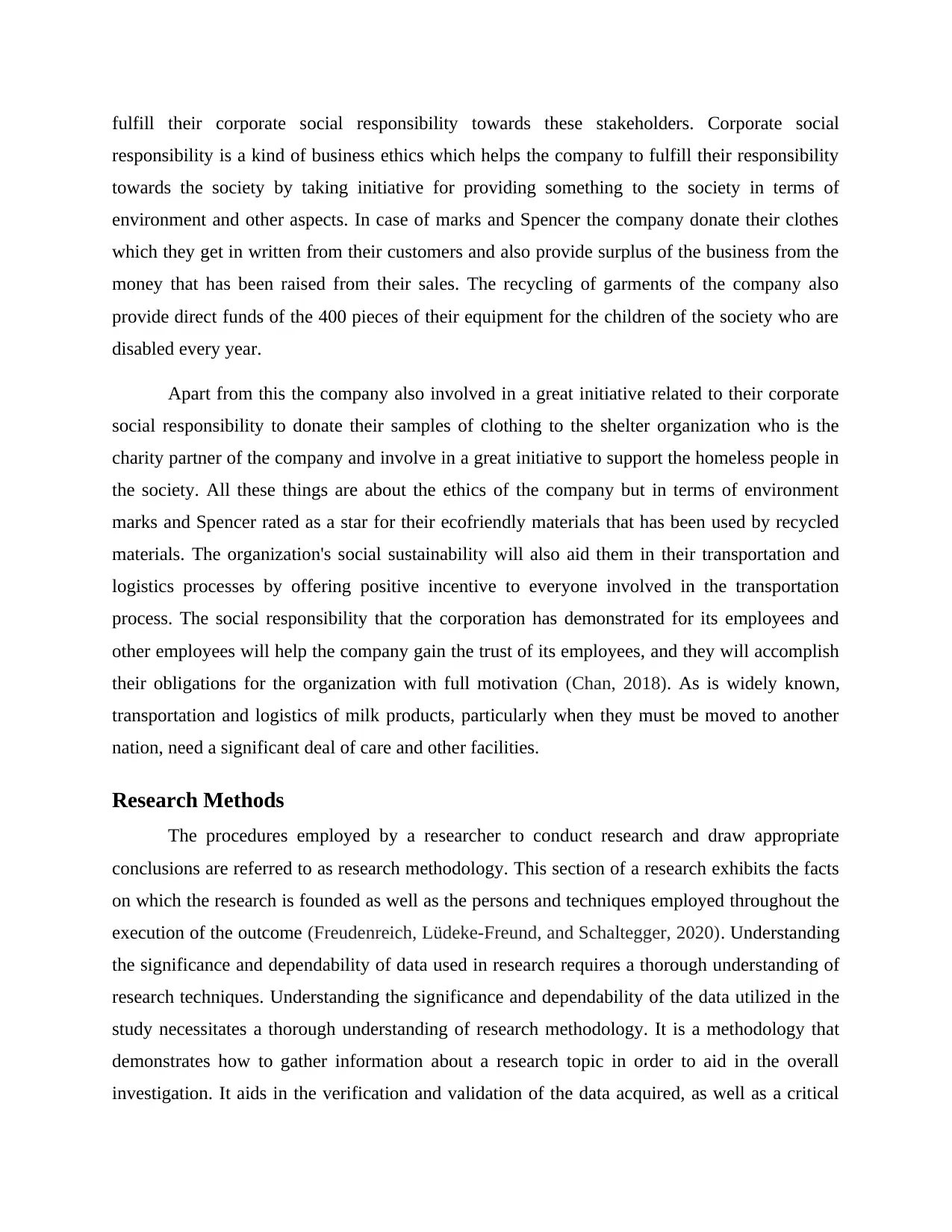
fulfill their corporate social responsibility towards these stakeholders. Corporate social
responsibility is a kind of business ethics which helps the company to fulfill their responsibility
towards the society by taking initiative for providing something to the society in terms of
environment and other aspects. In case of marks and Spencer the company donate their clothes
which they get in written from their customers and also provide surplus of the business from the
money that has been raised from their sales. The recycling of garments of the company also
provide direct funds of the 400 pieces of their equipment for the children of the society who are
disabled every year.
Apart from this the company also involved in a great initiative related to their corporate
social responsibility to donate their samples of clothing to the shelter organization who is the
charity partner of the company and involve in a great initiative to support the homeless people in
the society. All these things are about the ethics of the company but in terms of environment
marks and Spencer rated as a star for their ecofriendly materials that has been used by recycled
materials. The organization's social sustainability will also aid them in their transportation and
logistics processes by offering positive incentive to everyone involved in the transportation
process. The social responsibility that the corporation has demonstrated for its employees and
other employees will help the company gain the trust of its employees, and they will accomplish
their obligations for the organization with full motivation (Chan, 2018). As is widely known,
transportation and logistics of milk products, particularly when they must be moved to another
nation, need a significant deal of care and other facilities.
Research Methods
The procedures employed by a researcher to conduct research and draw appropriate
conclusions are referred to as research methodology. This section of a research exhibits the facts
on which the research is founded as well as the persons and techniques employed throughout the
execution of the outcome (Freudenreich, Lüdeke-Freund, and Schaltegger, 2020). Understanding
the significance and dependability of data used in research requires a thorough understanding of
research techniques. Understanding the significance and dependability of the data utilized in the
study necessitates a thorough understanding of research methodology. It is a methodology that
demonstrates how to gather information about a research topic in order to aid in the overall
investigation. It aids in the verification and validation of the data acquired, as well as a critical
responsibility is a kind of business ethics which helps the company to fulfill their responsibility
towards the society by taking initiative for providing something to the society in terms of
environment and other aspects. In case of marks and Spencer the company donate their clothes
which they get in written from their customers and also provide surplus of the business from the
money that has been raised from their sales. The recycling of garments of the company also
provide direct funds of the 400 pieces of their equipment for the children of the society who are
disabled every year.
Apart from this the company also involved in a great initiative related to their corporate
social responsibility to donate their samples of clothing to the shelter organization who is the
charity partner of the company and involve in a great initiative to support the homeless people in
the society. All these things are about the ethics of the company but in terms of environment
marks and Spencer rated as a star for their ecofriendly materials that has been used by recycled
materials. The organization's social sustainability will also aid them in their transportation and
logistics processes by offering positive incentive to everyone involved in the transportation
process. The social responsibility that the corporation has demonstrated for its employees and
other employees will help the company gain the trust of its employees, and they will accomplish
their obligations for the organization with full motivation (Chan, 2018). As is widely known,
transportation and logistics of milk products, particularly when they must be moved to another
nation, need a significant deal of care and other facilities.
Research Methods
The procedures employed by a researcher to conduct research and draw appropriate
conclusions are referred to as research methodology. This section of a research exhibits the facts
on which the research is founded as well as the persons and techniques employed throughout the
execution of the outcome (Freudenreich, Lüdeke-Freund, and Schaltegger, 2020). Understanding
the significance and dependability of data used in research requires a thorough understanding of
research techniques. Understanding the significance and dependability of the data utilized in the
study necessitates a thorough understanding of research methodology. It is a methodology that
demonstrates how to gather information about a research topic in order to aid in the overall
investigation. It aids in the verification and validation of the data acquired, as well as a critical
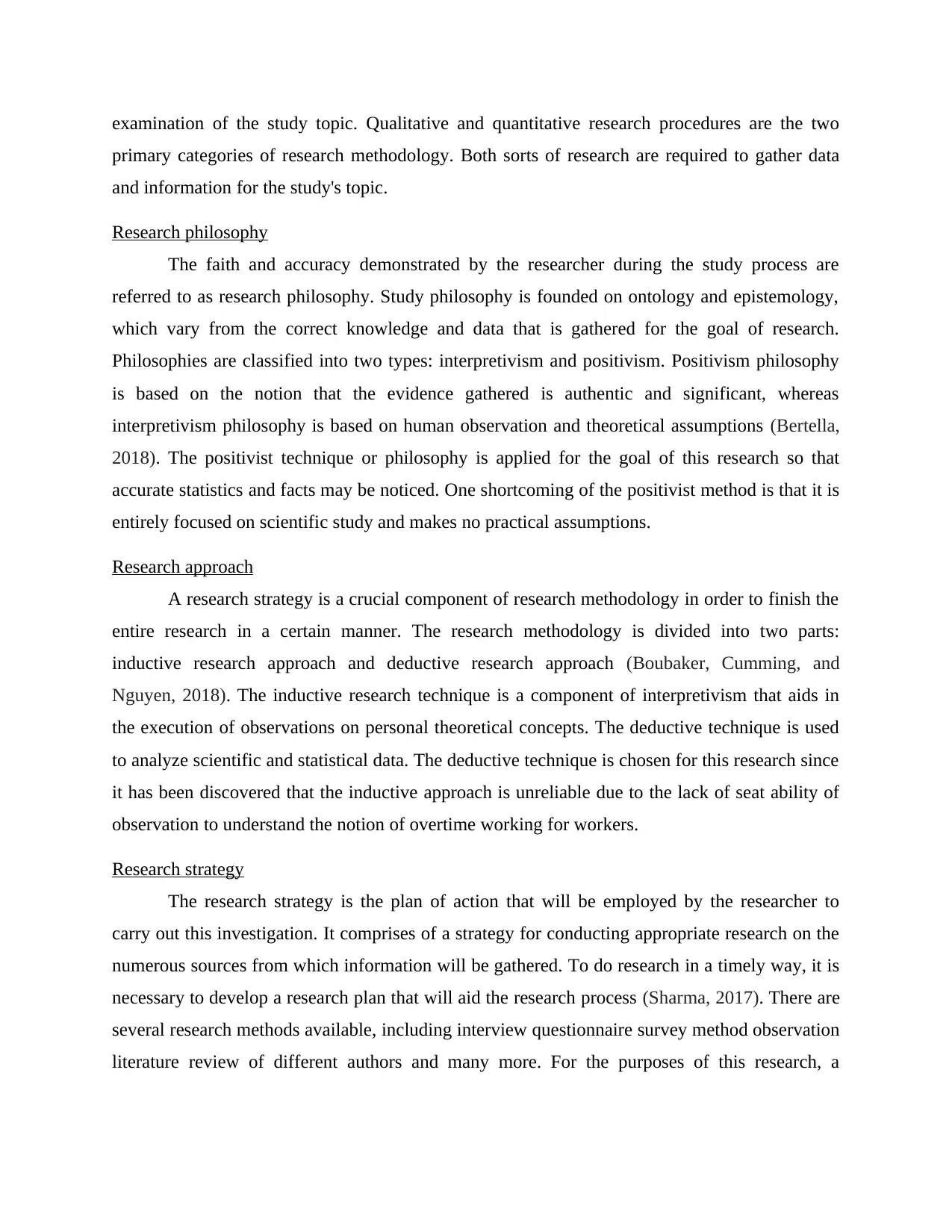
examination of the study topic. Qualitative and quantitative research procedures are the two
primary categories of research methodology. Both sorts of research are required to gather data
and information for the study's topic.
Research philosophy
The faith and accuracy demonstrated by the researcher during the study process are
referred to as research philosophy. Study philosophy is founded on ontology and epistemology,
which vary from the correct knowledge and data that is gathered for the goal of research.
Philosophies are classified into two types: interpretivism and positivism. Positivism philosophy
is based on the notion that the evidence gathered is authentic and significant, whereas
interpretivism philosophy is based on human observation and theoretical assumptions (Bertella,
2018). The positivist technique or philosophy is applied for the goal of this research so that
accurate statistics and facts may be noticed. One shortcoming of the positivist method is that it is
entirely focused on scientific study and makes no practical assumptions.
Research approach
A research strategy is a crucial component of research methodology in order to finish the
entire research in a certain manner. The research methodology is divided into two parts:
inductive research approach and deductive research approach (Boubaker, Cumming, and
Nguyen, 2018). The inductive research technique is a component of interpretivism that aids in
the execution of observations on personal theoretical concepts. The deductive technique is used
to analyze scientific and statistical data. The deductive technique is chosen for this research since
it has been discovered that the inductive approach is unreliable due to the lack of seat ability of
observation to understand the notion of overtime working for workers.
Research strategy
The research strategy is the plan of action that will be employed by the researcher to
carry out this investigation. It comprises of a strategy for conducting appropriate research on the
numerous sources from which information will be gathered. To do research in a timely way, it is
necessary to develop a research plan that will aid the research process (Sharma, 2017). There are
several research methods available, including interview questionnaire survey method observation
literature review of different authors and many more. For the purposes of this research, a
primary categories of research methodology. Both sorts of research are required to gather data
and information for the study's topic.
Research philosophy
The faith and accuracy demonstrated by the researcher during the study process are
referred to as research philosophy. Study philosophy is founded on ontology and epistemology,
which vary from the correct knowledge and data that is gathered for the goal of research.
Philosophies are classified into two types: interpretivism and positivism. Positivism philosophy
is based on the notion that the evidence gathered is authentic and significant, whereas
interpretivism philosophy is based on human observation and theoretical assumptions (Bertella,
2018). The positivist technique or philosophy is applied for the goal of this research so that
accurate statistics and facts may be noticed. One shortcoming of the positivist method is that it is
entirely focused on scientific study and makes no practical assumptions.
Research approach
A research strategy is a crucial component of research methodology in order to finish the
entire research in a certain manner. The research methodology is divided into two parts:
inductive research approach and deductive research approach (Boubaker, Cumming, and
Nguyen, 2018). The inductive research technique is a component of interpretivism that aids in
the execution of observations on personal theoretical concepts. The deductive technique is used
to analyze scientific and statistical data. The deductive technique is chosen for this research since
it has been discovered that the inductive approach is unreliable due to the lack of seat ability of
observation to understand the notion of overtime working for workers.
Research strategy
The research strategy is the plan of action that will be employed by the researcher to
carry out this investigation. It comprises of a strategy for conducting appropriate research on the
numerous sources from which information will be gathered. To do research in a timely way, it is
necessary to develop a research plan that will aid the research process (Sharma, 2017). There are
several research methods available, including interview questionnaire survey method observation
literature review of different authors and many more. For the purposes of this research, a
⊘ This is a preview!⊘
Do you want full access?
Subscribe today to unlock all pages.

Trusted by 1+ million students worldwide
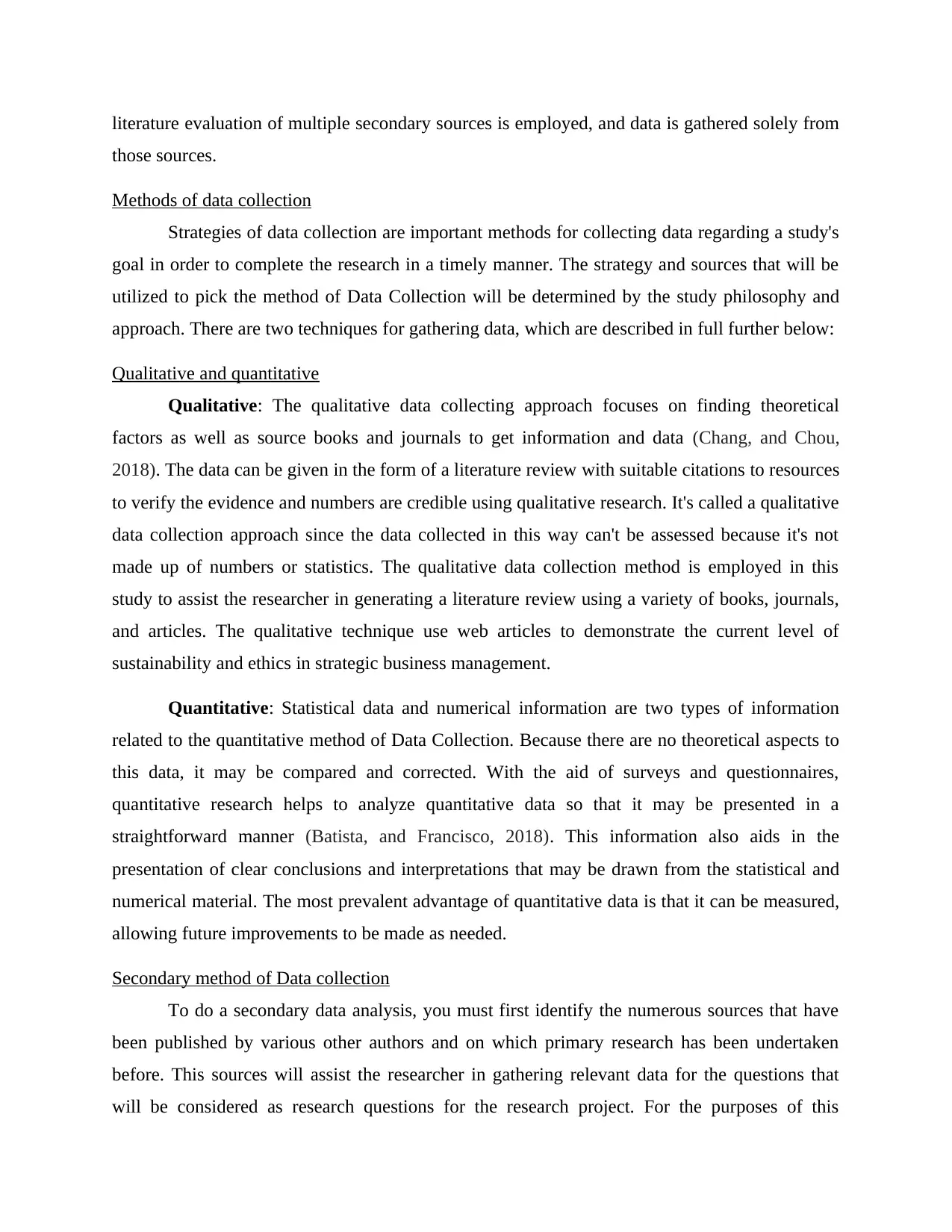
literature evaluation of multiple secondary sources is employed, and data is gathered solely from
those sources.
Methods of data collection
Strategies of data collection are important methods for collecting data regarding a study's
goal in order to complete the research in a timely manner. The strategy and sources that will be
utilized to pick the method of Data Collection will be determined by the study philosophy and
approach. There are two techniques for gathering data, which are described in full further below:
Qualitative and quantitative
Qualitative: The qualitative data collecting approach focuses on finding theoretical
factors as well as source books and journals to get information and data (Chang, and Chou,
2018). The data can be given in the form of a literature review with suitable citations to resources
to verify the evidence and numbers are credible using qualitative research. It's called a qualitative
data collection approach since the data collected in this way can't be assessed because it's not
made up of numbers or statistics. The qualitative data collection method is employed in this
study to assist the researcher in generating a literature review using a variety of books, journals,
and articles. The qualitative technique use web articles to demonstrate the current level of
sustainability and ethics in strategic business management.
Quantitative: Statistical data and numerical information are two types of information
related to the quantitative method of Data Collection. Because there are no theoretical aspects to
this data, it may be compared and corrected. With the aid of surveys and questionnaires,
quantitative research helps to analyze quantitative data so that it may be presented in a
straightforward manner (Batista, and Francisco, 2018). This information also aids in the
presentation of clear conclusions and interpretations that may be drawn from the statistical and
numerical material. The most prevalent advantage of quantitative data is that it can be measured,
allowing future improvements to be made as needed.
Secondary method of Data collection
To do a secondary data analysis, you must first identify the numerous sources that have
been published by various other authors and on which primary research has been undertaken
before. This sources will assist the researcher in gathering relevant data for the questions that
will be considered as research questions for the research project. For the purposes of this
those sources.
Methods of data collection
Strategies of data collection are important methods for collecting data regarding a study's
goal in order to complete the research in a timely manner. The strategy and sources that will be
utilized to pick the method of Data Collection will be determined by the study philosophy and
approach. There are two techniques for gathering data, which are described in full further below:
Qualitative and quantitative
Qualitative: The qualitative data collecting approach focuses on finding theoretical
factors as well as source books and journals to get information and data (Chang, and Chou,
2018). The data can be given in the form of a literature review with suitable citations to resources
to verify the evidence and numbers are credible using qualitative research. It's called a qualitative
data collection approach since the data collected in this way can't be assessed because it's not
made up of numbers or statistics. The qualitative data collection method is employed in this
study to assist the researcher in generating a literature review using a variety of books, journals,
and articles. The qualitative technique use web articles to demonstrate the current level of
sustainability and ethics in strategic business management.
Quantitative: Statistical data and numerical information are two types of information
related to the quantitative method of Data Collection. Because there are no theoretical aspects to
this data, it may be compared and corrected. With the aid of surveys and questionnaires,
quantitative research helps to analyze quantitative data so that it may be presented in a
straightforward manner (Batista, and Francisco, 2018). This information also aids in the
presentation of clear conclusions and interpretations that may be drawn from the statistical and
numerical material. The most prevalent advantage of quantitative data is that it can be measured,
allowing future improvements to be made as needed.
Secondary method of Data collection
To do a secondary data analysis, you must first identify the numerous sources that have
been published by various other authors and on which primary research has been undertaken
before. This sources will assist the researcher in gathering relevant data for the questions that
will be considered as research questions for the research project. For the purposes of this
Paraphrase This Document
Need a fresh take? Get an instant paraphrase of this document with our AI Paraphraser
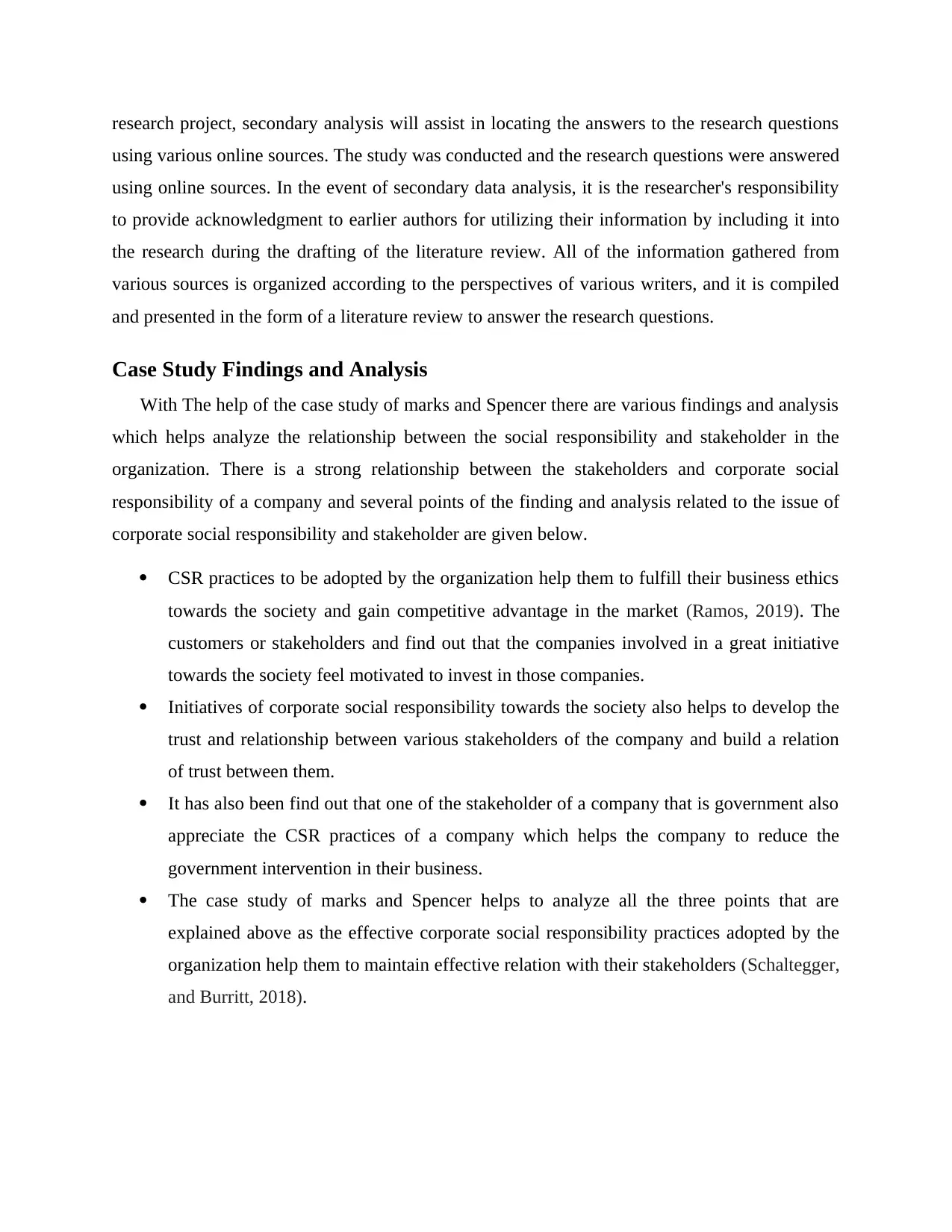
research project, secondary analysis will assist in locating the answers to the research questions
using various online sources. The study was conducted and the research questions were answered
using online sources. In the event of secondary data analysis, it is the researcher's responsibility
to provide acknowledgment to earlier authors for utilizing their information by including it into
the research during the drafting of the literature review. All of the information gathered from
various sources is organized according to the perspectives of various writers, and it is compiled
and presented in the form of a literature review to answer the research questions.
Case Study Findings and Analysis
With The help of the case study of marks and Spencer there are various findings and analysis
which helps analyze the relationship between the social responsibility and stakeholder in the
organization. There is a strong relationship between the stakeholders and corporate social
responsibility of a company and several points of the finding and analysis related to the issue of
corporate social responsibility and stakeholder are given below.
CSR practices to be adopted by the organization help them to fulfill their business ethics
towards the society and gain competitive advantage in the market (Ramos, 2019). The
customers or stakeholders and find out that the companies involved in a great initiative
towards the society feel motivated to invest in those companies.
Initiatives of corporate social responsibility towards the society also helps to develop the
trust and relationship between various stakeholders of the company and build a relation
of trust between them.
It has also been find out that one of the stakeholder of a company that is government also
appreciate the CSR practices of a company which helps the company to reduce the
government intervention in their business.
The case study of marks and Spencer helps to analyze all the three points that are
explained above as the effective corporate social responsibility practices adopted by the
organization help them to maintain effective relation with their stakeholders (Schaltegger,
and Burritt, 2018).
using various online sources. The study was conducted and the research questions were answered
using online sources. In the event of secondary data analysis, it is the researcher's responsibility
to provide acknowledgment to earlier authors for utilizing their information by including it into
the research during the drafting of the literature review. All of the information gathered from
various sources is organized according to the perspectives of various writers, and it is compiled
and presented in the form of a literature review to answer the research questions.
Case Study Findings and Analysis
With The help of the case study of marks and Spencer there are various findings and analysis
which helps analyze the relationship between the social responsibility and stakeholder in the
organization. There is a strong relationship between the stakeholders and corporate social
responsibility of a company and several points of the finding and analysis related to the issue of
corporate social responsibility and stakeholder are given below.
CSR practices to be adopted by the organization help them to fulfill their business ethics
towards the society and gain competitive advantage in the market (Ramos, 2019). The
customers or stakeholders and find out that the companies involved in a great initiative
towards the society feel motivated to invest in those companies.
Initiatives of corporate social responsibility towards the society also helps to develop the
trust and relationship between various stakeholders of the company and build a relation
of trust between them.
It has also been find out that one of the stakeholder of a company that is government also
appreciate the CSR practices of a company which helps the company to reduce the
government intervention in their business.
The case study of marks and Spencer helps to analyze all the three points that are
explained above as the effective corporate social responsibility practices adopted by the
organization help them to maintain effective relation with their stakeholders (Schaltegger,
and Burritt, 2018).
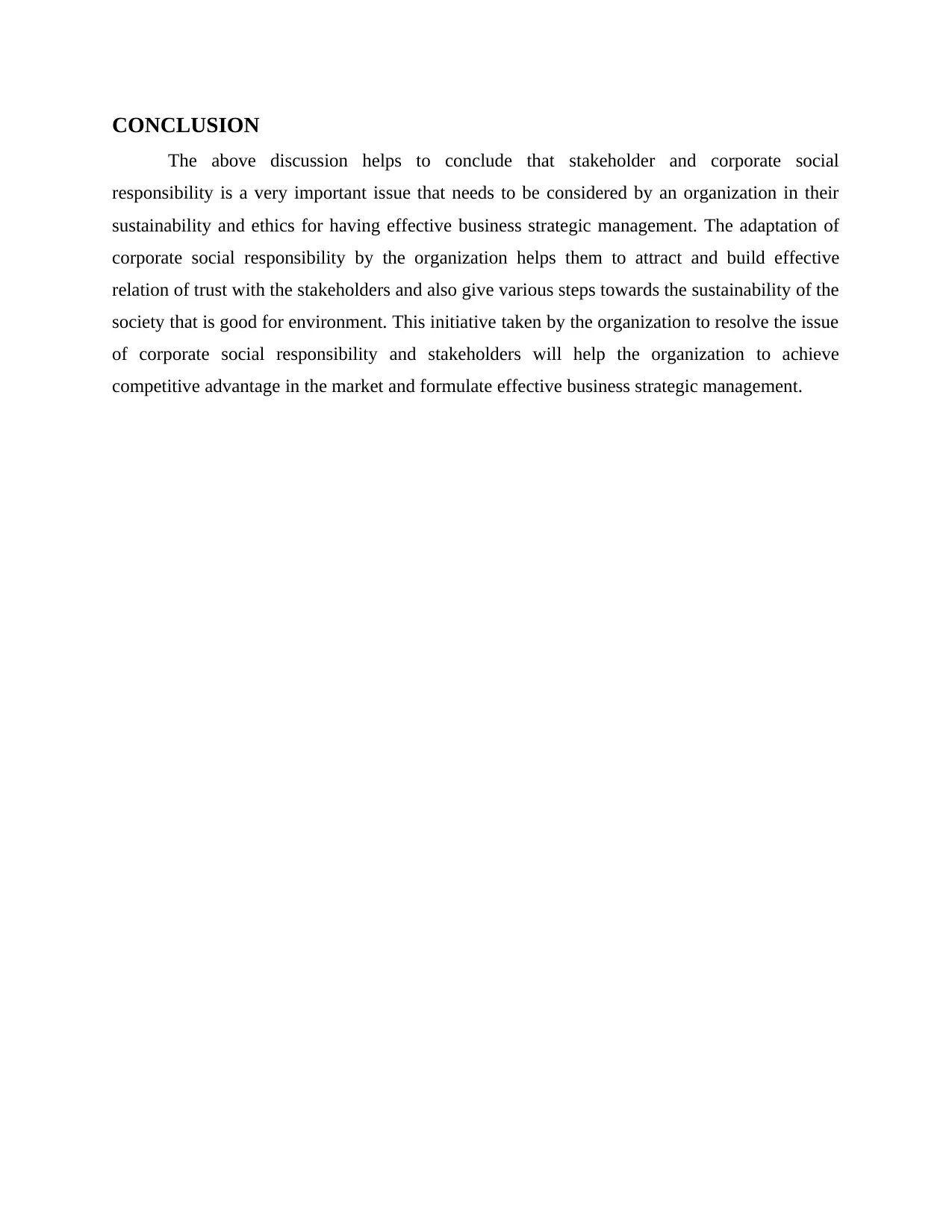
CONCLUSION
The above discussion helps to conclude that stakeholder and corporate social
responsibility is a very important issue that needs to be considered by an organization in their
sustainability and ethics for having effective business strategic management. The adaptation of
corporate social responsibility by the organization helps them to attract and build effective
relation of trust with the stakeholders and also give various steps towards the sustainability of the
society that is good for environment. This initiative taken by the organization to resolve the issue
of corporate social responsibility and stakeholders will help the organization to achieve
competitive advantage in the market and formulate effective business strategic management.
The above discussion helps to conclude that stakeholder and corporate social
responsibility is a very important issue that needs to be considered by an organization in their
sustainability and ethics for having effective business strategic management. The adaptation of
corporate social responsibility by the organization helps them to attract and build effective
relation of trust with the stakeholders and also give various steps towards the sustainability of the
society that is good for environment. This initiative taken by the organization to resolve the issue
of corporate social responsibility and stakeholders will help the organization to achieve
competitive advantage in the market and formulate effective business strategic management.
⊘ This is a preview!⊘
Do you want full access?
Subscribe today to unlock all pages.

Trusted by 1+ million students worldwide
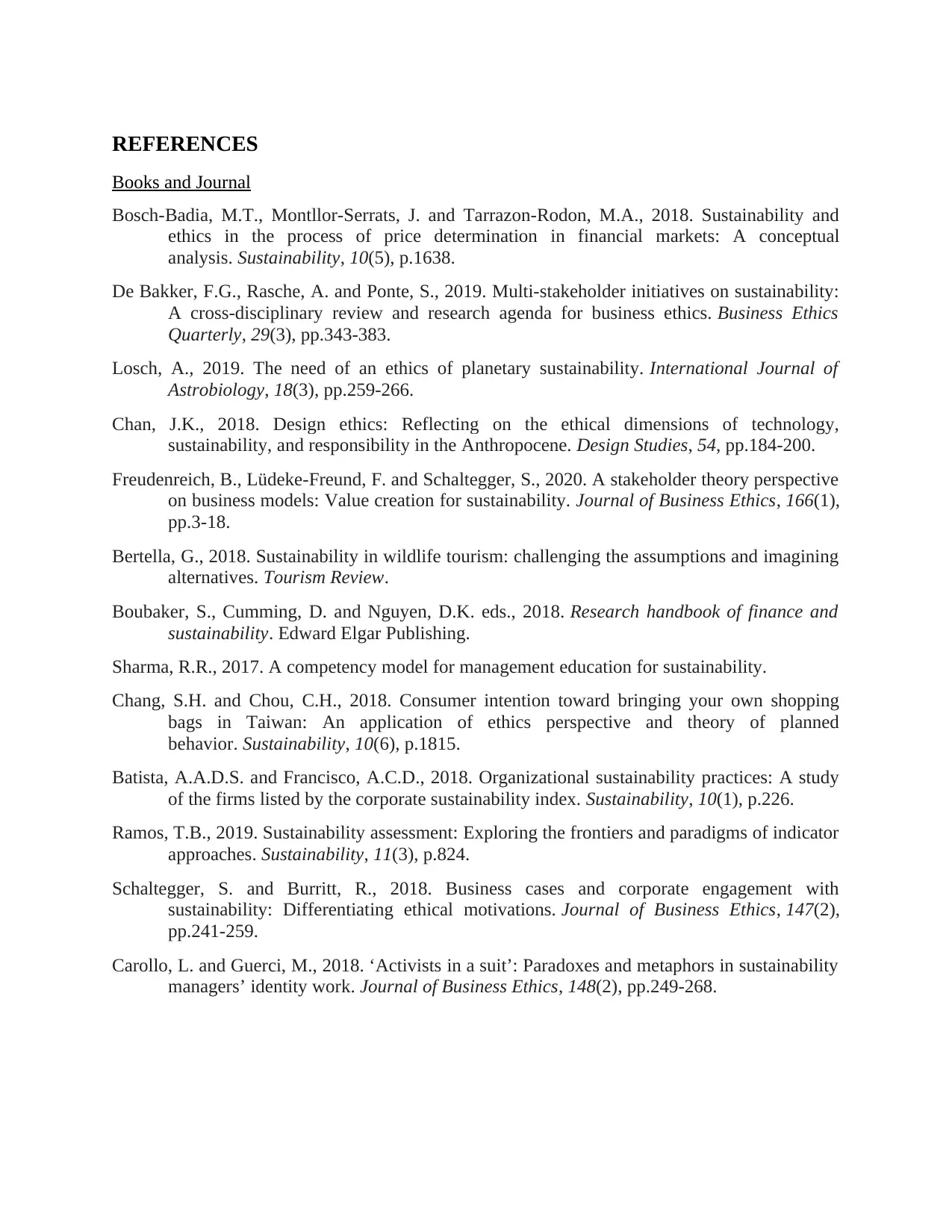
REFERENCES
Books and Journal
Bosch-Badia, M.T., Montllor-Serrats, J. and Tarrazon-Rodon, M.A., 2018. Sustainability and
ethics in the process of price determination in financial markets: A conceptual
analysis. Sustainability, 10(5), p.1638.
De Bakker, F.G., Rasche, A. and Ponte, S., 2019. Multi-stakeholder initiatives on sustainability:
A cross-disciplinary review and research agenda for business ethics. Business Ethics
Quarterly, 29(3), pp.343-383.
Losch, A., 2019. The need of an ethics of planetary sustainability. International Journal of
Astrobiology, 18(3), pp.259-266.
Chan, J.K., 2018. Design ethics: Reflecting on the ethical dimensions of technology,
sustainability, and responsibility in the Anthropocene. Design Studies, 54, pp.184-200.
Freudenreich, B., Lüdeke-Freund, F. and Schaltegger, S., 2020. A stakeholder theory perspective
on business models: Value creation for sustainability. Journal of Business Ethics, 166(1),
pp.3-18.
Bertella, G., 2018. Sustainability in wildlife tourism: challenging the assumptions and imagining
alternatives. Tourism Review.
Boubaker, S., Cumming, D. and Nguyen, D.K. eds., 2018. Research handbook of finance and
sustainability. Edward Elgar Publishing.
Sharma, R.R., 2017. A competency model for management education for sustainability.
Chang, S.H. and Chou, C.H., 2018. Consumer intention toward bringing your own shopping
bags in Taiwan: An application of ethics perspective and theory of planned
behavior. Sustainability, 10(6), p.1815.
Batista, A.A.D.S. and Francisco, A.C.D., 2018. Organizational sustainability practices: A study
of the firms listed by the corporate sustainability index. Sustainability, 10(1), p.226.
Ramos, T.B., 2019. Sustainability assessment: Exploring the frontiers and paradigms of indicator
approaches. Sustainability, 11(3), p.824.
Schaltegger, S. and Burritt, R., 2018. Business cases and corporate engagement with
sustainability: Differentiating ethical motivations. Journal of Business Ethics, 147(2),
pp.241-259.
Carollo, L. and Guerci, M., 2018. ‘Activists in a suit’: Paradoxes and metaphors in sustainability
managers’ identity work. Journal of Business Ethics, 148(2), pp.249-268.
Books and Journal
Bosch-Badia, M.T., Montllor-Serrats, J. and Tarrazon-Rodon, M.A., 2018. Sustainability and
ethics in the process of price determination in financial markets: A conceptual
analysis. Sustainability, 10(5), p.1638.
De Bakker, F.G., Rasche, A. and Ponte, S., 2019. Multi-stakeholder initiatives on sustainability:
A cross-disciplinary review and research agenda for business ethics. Business Ethics
Quarterly, 29(3), pp.343-383.
Losch, A., 2019. The need of an ethics of planetary sustainability. International Journal of
Astrobiology, 18(3), pp.259-266.
Chan, J.K., 2018. Design ethics: Reflecting on the ethical dimensions of technology,
sustainability, and responsibility in the Anthropocene. Design Studies, 54, pp.184-200.
Freudenreich, B., Lüdeke-Freund, F. and Schaltegger, S., 2020. A stakeholder theory perspective
on business models: Value creation for sustainability. Journal of Business Ethics, 166(1),
pp.3-18.
Bertella, G., 2018. Sustainability in wildlife tourism: challenging the assumptions and imagining
alternatives. Tourism Review.
Boubaker, S., Cumming, D. and Nguyen, D.K. eds., 2018. Research handbook of finance and
sustainability. Edward Elgar Publishing.
Sharma, R.R., 2017. A competency model for management education for sustainability.
Chang, S.H. and Chou, C.H., 2018. Consumer intention toward bringing your own shopping
bags in Taiwan: An application of ethics perspective and theory of planned
behavior. Sustainability, 10(6), p.1815.
Batista, A.A.D.S. and Francisco, A.C.D., 2018. Organizational sustainability practices: A study
of the firms listed by the corporate sustainability index. Sustainability, 10(1), p.226.
Ramos, T.B., 2019. Sustainability assessment: Exploring the frontiers and paradigms of indicator
approaches. Sustainability, 11(3), p.824.
Schaltegger, S. and Burritt, R., 2018. Business cases and corporate engagement with
sustainability: Differentiating ethical motivations. Journal of Business Ethics, 147(2),
pp.241-259.
Carollo, L. and Guerci, M., 2018. ‘Activists in a suit’: Paradoxes and metaphors in sustainability
managers’ identity work. Journal of Business Ethics, 148(2), pp.249-268.
1 out of 10
Related Documents
Your All-in-One AI-Powered Toolkit for Academic Success.
+13062052269
info@desklib.com
Available 24*7 on WhatsApp / Email
![[object Object]](/_next/static/media/star-bottom.7253800d.svg)
Unlock your academic potential
Copyright © 2020–2026 A2Z Services. All Rights Reserved. Developed and managed by ZUCOL.




